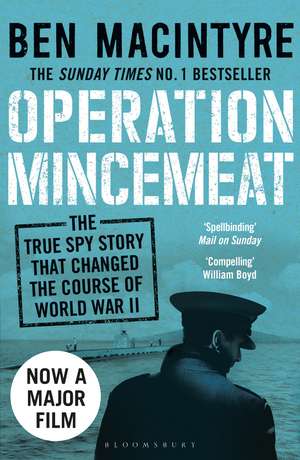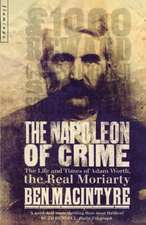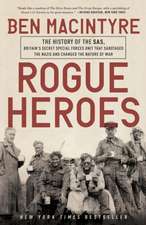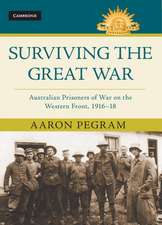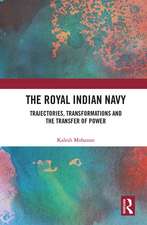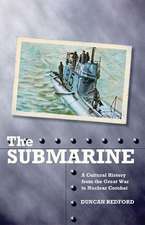Operation Mincemeat: The True Spy Story that Changed the Course of World War II
Autor Ben Macintyreen Limba Engleză Paperback – 21 sep 2016
| Toate formatele și edițiile | Preț | Express |
|---|---|---|
| Paperback (2) | 54.90 lei 22-36 zile | |
| Bloomsbury Publishing – 21 sep 2016 | 54.90 lei 22-36 zile | |
| BROADWAY BOOKS – 31 mar 2011 | 109.74 lei 22-36 zile |
Preț: 54.90 lei
Preț vechi: 81.36 lei
-33% Nou
Puncte Express: 82
Preț estimativ în valută:
10.51€ • 11.42$ • 8.83£
10.51€ • 11.42$ • 8.83£
Carte disponibilă
Livrare economică 31 martie-14 aprilie
Preluare comenzi: 021 569.72.76
Specificații
ISBN-13: 9781408885390
ISBN-10: 1408885395
Pagini: 432
Dimensiuni: 129 x 198 x 34 mm
Greutate: 0.33 kg
Editura: Bloomsbury Publishing
Colecția Bloomsbury Paperbacks
Locul publicării:London, United Kingdom
ISBN-10: 1408885395
Pagini: 432
Dimensiuni: 129 x 198 x 34 mm
Greutate: 0.33 kg
Editura: Bloomsbury Publishing
Colecția Bloomsbury Paperbacks
Locul publicării:London, United Kingdom
Caracteristici
Agent Zigzag has sold over 100,000 copies (BookScan); it was shortlisted for the Costa Biography Award and the Galaxy British Book Award for Biography of the Year 2008
Notă biografică
Ben Macintyre is a columnist and Associate Editor on The Times. He has worked as the newspaper's correspondent in New York, Paris and Washington. He is the author of seven previous books including Agent Zigzag, the story of wartime double-agent Eddie Chapman, which was shortlisted for the Costa Biography Award and the Galaxy British Book Award for Biography of the Year 2008. He lives in London.
Recenzii
A rollicking read for all those who enjoy a spy story so fanciful that Ian Fleming - himself an officer in Montagu's wartime department - would never have dared to invent it
Ben Macintyre, also the author of the acclaimed Agent Zigzag, is fast becoming a one-man industry in these updated tales of cunning, bravery and skulduggery. With his mix of meticulous research and a good hack's eye for narrative, it is hard to think of a better guide to keep beckoning us back to that fascinating world
Macintyre has a journalist's nose for a great story, and a novelist's skill in its narration ... Even more spellbinding than his previous story of wartime espionage, Agent Zigzag, with a cast-list every bit as dotty and colourful ... Macintyre is a master of the thumbnail character sketch
Astonishing ... Sheds riveting new light on this breathtaking plan
With its fantastic plot and its cast of eccentric characters, the book reads like the most improbable of spy stories. It is a tribute to Macintyre's skill that we never for a moment forget that it is actually all true
Brilliant and almost absurdly entertaining
Ben Macintyre, also the author of the acclaimed Agent Zigzag, is fast becoming a one-man industry in these updated tales of cunning, bravery and skulduggery. With his mix of meticulous research and a good hack's eye for narrative, it is hard to think of a better guide to keep beckoning us back to that fascinating world
Macintyre has a journalist's nose for a great story, and a novelist's skill in its narration ... Even more spellbinding than his previous story of wartime espionage, Agent Zigzag, with a cast-list every bit as dotty and colourful ... Macintyre is a master of the thumbnail character sketch
Astonishing ... Sheds riveting new light on this breathtaking plan
With its fantastic plot and its cast of eccentric characters, the book reads like the most improbable of spy stories. It is a tribute to Macintyre's skill that we never for a moment forget that it is actually all true
Brilliant and almost absurdly entertaining
Descriere
From the bestselling author of Agent Zigzag. The thrilling true story of the greatest and most successful wartime deception ever attempted
A Richard & Judy Book Club selection
A Richard & Judy Book Club selection
Extras
Chapter One
The Sardine Spotter
José Antonio Rey María had no intention of making history when he rowed out into the Atlantic from the coast of Andalusia in southwest Spain on April 30, 1943. He was merely looking for sardines.
José was proud of his reputation as the best fish spotter in Punta Umbria. On a clear day, he could pick out the telltale iridescent flash of sardines several fathoms deep. When he saw a shoal, José would mark the place with a buoy and then signal to Pepe Cordero and the other fishermen in the larger boat, La Calina, to row over swiftly with the horseshoe net.
But the weather today was bad for fish spotting. The sky was overcast, and an onshore wind ruffled the water's surface. The fishermen of Punta Umbria had set out before dawn, but so far they had caught only anchovies and a few bream. Rowing Ana, his little skiff, in a wide arc, José scanned the water again, the rising sun warming his back. On the shore, he could see the little cluster of fishing huts beneath the dunes on Playa del Portil, his home. Beyond that, past the estuary where the rivers Odiel and Tinto flowed into the sea, lay the port of Huelva.
The war, now in its fourth year, had hardly touched this part of Spain. Sometimes José would come across strange flotsam in the water- fragments of charred wood, pools of oil, and other debris that told of battles somewhere out at sea. Earlier that morning, he had heard gunfire in the distance, and a loud explosion. Pepe said that the war was ruining the fishing business, as no one had any money, and he might have to sell La Calina and Ana. It was rumoured that the captains of some of the larger fishing boats spied for the Germans or the British. But in most ways the hard lives of the fishermen continued as they had always done.
José had been born on the beach, in a hut made from driftwood, twenty- three years earlier. He had never traveled beyond Huelva. He had never been to school or learned to read and write. But no one in Punta Umbria was better at spotting fish.
It was midmorning when José noticed a "lump" above the surface of the water. At first he thought it must be a dead porpoise, but as he rowed closer the shape grew clearer, and then unmistakable. It was a body, floating, facedown, buoyed by a yellow life jacket, the lower part of the torso invisible. The figure seemed to be dressed in uniform.
As he reached over the gunwale to grab the body, José caught a gust of putrefaction and found himself looking into the face of a man, or, rather, what had been the face of a man. The chin was entirely covered in green mold, while the upper part of the face was dark, as if tanned by the sun. José wondered if the dead man had been burned in some accident at sea. The skin on the nose and chin had begun to rot away.
José waved and shouted to the other fishermen. As La Calina drew alongside, Pepe and the crew clustered to the gunwale. José called for them to throw down a rope and haul the body aboard, but "no-one wanted to touch it." Annoyed, José realized he would have to bring it ashore himself. Seizing a handful of sodden uniform, he hauled the corpse onto the stern, and with the legs still trailing in the water, he rowed back to shore, trying not to breathe in the smell.
On the part of the beach called La Bota-the boot-José and Pepe dragged the body up to the dunes. A black briefcase, attached to the man by a chain, trailed in the sand behind them. They laid out the corpse in the shade of a pine tree. Children streamed out of the huts and gathered around the gruesome spectacle. The man was tall, at least six feet, dressed in a khaki tunic and trench coat, with large army boots. Seventeen-year-old Obdulia Serrano spotted a small silver chain with a cross around his neck. The dead man must have been a Roman Catholic.
Obdulia was sent to summon the officer from the defense unit guarding this part of the coast. A dozen men of Spain's Seventy-second Infantry Regiment had been marching up and down the beach earlier that morning, as they did, rather pointlessly, most mornings, and the soldiers were now taking a siesta under the trees. The officer ordered two of his men to stand guard over the body, in case someone tried to go through the dead man's pockets, and trudged off up the beach to find his commanding officer.
The scent of the wild rosemary and jacaranda growing in the dunes could not mask the stench of decomposition. Flies buzzed around the body. The soldiers moved upwind. Somebody went to fetch a donkey to carry the body to the village of Punta Umbria four miles away. From there, it could be taken by boat across the estuary to Huelva. The children dispersed.
José Antonio Rey María, perfectly unaware of the events he had just set in motion, pushed his little boat back into the sea and resumed his search for sardines.
Two months earlier, in a tiny, tobacco-stained basement room beneath the Admiralty building in Whitehall, two men had sat puzzling over a conundrum of their own devising: how to create a person from nothing, a man who had never been. The younger man was tall and thin, with thick spectacles and an elaborate air-force mustache, which he twiddled in rapt concentration. The other, elegant and languid, was dressed in naval uniform and sucked on a curved pipe that fizzed and crackled evilly. The stuffy underground cavern lacked windows, natural light, and ventilation. The walls were covered in large maps and the ceiling stained a greasy nicotine yellow. It had once been a wine cellar. Now it was home to a section of the British Secret Service made up of four intelligence officers, seven secretaries and typists, six typewriters, a bank of locked filing cabinets, a dozen ashtrays, and two scrambler telephones. Section 17M was so secret that barely twenty people outside the room even knew of its existence.
Room 13 of the Admiralty was a clearinghouse of secrets, lies, and whispers. Every day the most lethal and valuable intelligence-decoded messages, deception plans, enemy troop movements, coded spy reports, and other mysteries-poured into this little basement room, where they were analyzed, assessed, and dispatched to distant parts of the world, the armor and ammunition of a secret war.
The two officers-Pipe and Mustache-were also responsible for running agents and double agents, espionage and counterespionage, intelligence, fakery, and fraud: they passed lies to the enemy that were false and damaging, as well as information that was true but harmless; they ran willing spies, reluctant spies pressed into service, and spies who did not exist at all. Now, with the war at its height, they set about creating a spy who was different from all the others and all that had come before: a secret agent who was not only fictional but dead.
The defining feature of this spy would be his falsity. He was a pure figment of imagination, a weapon in a war far removed from the traditional battle of bombs and bullets. At its most visible, war is fought with leadership, courage, tactics, and brute force; this is the conventional war of attack and counterattack, lines on a map, numbers and luck. This war is usually painted in black, white, and blood red, with winners, losers, and casualties: the good, the bad, and the dead. Alongside that conflict is another, less visible species of war, played out in shades of gray, a battle of deception, seduction, and bad faith, of tricks and mirrors, in which the truth is protected, as Churchill put it, by a "bodyguard of lies." The combatants in this war of the imagination were seldom what they seemed to be, for the covert world, in which fiction and reality are sometimes enemies and sometimes allies, attracts minds that are subtle, supple, and often extremely strange.
The man lying in the dunes at Punta Umbria was a fraud. The lies he carried would fly from London to Madrid to Berlin, traveling from a freezing Scottish loch to the shores of Sicily, from fiction to reality, and from Room 13 of the Admiralty all the way to Hitler's desk.
From the Hardcover edition.
The Sardine Spotter
José Antonio Rey María had no intention of making history when he rowed out into the Atlantic from the coast of Andalusia in southwest Spain on April 30, 1943. He was merely looking for sardines.
José was proud of his reputation as the best fish spotter in Punta Umbria. On a clear day, he could pick out the telltale iridescent flash of sardines several fathoms deep. When he saw a shoal, José would mark the place with a buoy and then signal to Pepe Cordero and the other fishermen in the larger boat, La Calina, to row over swiftly with the horseshoe net.
But the weather today was bad for fish spotting. The sky was overcast, and an onshore wind ruffled the water's surface. The fishermen of Punta Umbria had set out before dawn, but so far they had caught only anchovies and a few bream. Rowing Ana, his little skiff, in a wide arc, José scanned the water again, the rising sun warming his back. On the shore, he could see the little cluster of fishing huts beneath the dunes on Playa del Portil, his home. Beyond that, past the estuary where the rivers Odiel and Tinto flowed into the sea, lay the port of Huelva.
The war, now in its fourth year, had hardly touched this part of Spain. Sometimes José would come across strange flotsam in the water- fragments of charred wood, pools of oil, and other debris that told of battles somewhere out at sea. Earlier that morning, he had heard gunfire in the distance, and a loud explosion. Pepe said that the war was ruining the fishing business, as no one had any money, and he might have to sell La Calina and Ana. It was rumoured that the captains of some of the larger fishing boats spied for the Germans or the British. But in most ways the hard lives of the fishermen continued as they had always done.
José had been born on the beach, in a hut made from driftwood, twenty- three years earlier. He had never traveled beyond Huelva. He had never been to school or learned to read and write. But no one in Punta Umbria was better at spotting fish.
It was midmorning when José noticed a "lump" above the surface of the water. At first he thought it must be a dead porpoise, but as he rowed closer the shape grew clearer, and then unmistakable. It was a body, floating, facedown, buoyed by a yellow life jacket, the lower part of the torso invisible. The figure seemed to be dressed in uniform.
As he reached over the gunwale to grab the body, José caught a gust of putrefaction and found himself looking into the face of a man, or, rather, what had been the face of a man. The chin was entirely covered in green mold, while the upper part of the face was dark, as if tanned by the sun. José wondered if the dead man had been burned in some accident at sea. The skin on the nose and chin had begun to rot away.
José waved and shouted to the other fishermen. As La Calina drew alongside, Pepe and the crew clustered to the gunwale. José called for them to throw down a rope and haul the body aboard, but "no-one wanted to touch it." Annoyed, José realized he would have to bring it ashore himself. Seizing a handful of sodden uniform, he hauled the corpse onto the stern, and with the legs still trailing in the water, he rowed back to shore, trying not to breathe in the smell.
On the part of the beach called La Bota-the boot-José and Pepe dragged the body up to the dunes. A black briefcase, attached to the man by a chain, trailed in the sand behind them. They laid out the corpse in the shade of a pine tree. Children streamed out of the huts and gathered around the gruesome spectacle. The man was tall, at least six feet, dressed in a khaki tunic and trench coat, with large army boots. Seventeen-year-old Obdulia Serrano spotted a small silver chain with a cross around his neck. The dead man must have been a Roman Catholic.
Obdulia was sent to summon the officer from the defense unit guarding this part of the coast. A dozen men of Spain's Seventy-second Infantry Regiment had been marching up and down the beach earlier that morning, as they did, rather pointlessly, most mornings, and the soldiers were now taking a siesta under the trees. The officer ordered two of his men to stand guard over the body, in case someone tried to go through the dead man's pockets, and trudged off up the beach to find his commanding officer.
The scent of the wild rosemary and jacaranda growing in the dunes could not mask the stench of decomposition. Flies buzzed around the body. The soldiers moved upwind. Somebody went to fetch a donkey to carry the body to the village of Punta Umbria four miles away. From there, it could be taken by boat across the estuary to Huelva. The children dispersed.
José Antonio Rey María, perfectly unaware of the events he had just set in motion, pushed his little boat back into the sea and resumed his search for sardines.
Two months earlier, in a tiny, tobacco-stained basement room beneath the Admiralty building in Whitehall, two men had sat puzzling over a conundrum of their own devising: how to create a person from nothing, a man who had never been. The younger man was tall and thin, with thick spectacles and an elaborate air-force mustache, which he twiddled in rapt concentration. The other, elegant and languid, was dressed in naval uniform and sucked on a curved pipe that fizzed and crackled evilly. The stuffy underground cavern lacked windows, natural light, and ventilation. The walls were covered in large maps and the ceiling stained a greasy nicotine yellow. It had once been a wine cellar. Now it was home to a section of the British Secret Service made up of four intelligence officers, seven secretaries and typists, six typewriters, a bank of locked filing cabinets, a dozen ashtrays, and two scrambler telephones. Section 17M was so secret that barely twenty people outside the room even knew of its existence.
Room 13 of the Admiralty was a clearinghouse of secrets, lies, and whispers. Every day the most lethal and valuable intelligence-decoded messages, deception plans, enemy troop movements, coded spy reports, and other mysteries-poured into this little basement room, where they were analyzed, assessed, and dispatched to distant parts of the world, the armor and ammunition of a secret war.
The two officers-Pipe and Mustache-were also responsible for running agents and double agents, espionage and counterespionage, intelligence, fakery, and fraud: they passed lies to the enemy that were false and damaging, as well as information that was true but harmless; they ran willing spies, reluctant spies pressed into service, and spies who did not exist at all. Now, with the war at its height, they set about creating a spy who was different from all the others and all that had come before: a secret agent who was not only fictional but dead.
The defining feature of this spy would be his falsity. He was a pure figment of imagination, a weapon in a war far removed from the traditional battle of bombs and bullets. At its most visible, war is fought with leadership, courage, tactics, and brute force; this is the conventional war of attack and counterattack, lines on a map, numbers and luck. This war is usually painted in black, white, and blood red, with winners, losers, and casualties: the good, the bad, and the dead. Alongside that conflict is another, less visible species of war, played out in shades of gray, a battle of deception, seduction, and bad faith, of tricks and mirrors, in which the truth is protected, as Churchill put it, by a "bodyguard of lies." The combatants in this war of the imagination were seldom what they seemed to be, for the covert world, in which fiction and reality are sometimes enemies and sometimes allies, attracts minds that are subtle, supple, and often extremely strange.
The man lying in the dunes at Punta Umbria was a fraud. The lies he carried would fly from London to Madrid to Berlin, traveling from a freezing Scottish loch to the shores of Sicily, from fiction to reality, and from Room 13 of the Admiralty all the way to Hitler's desk.
From the Hardcover edition.
